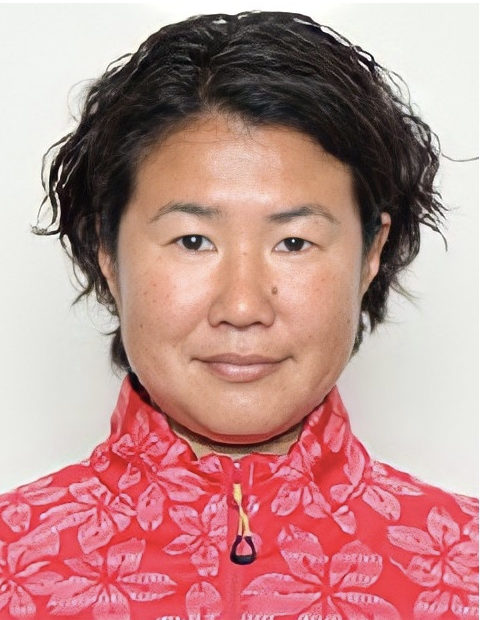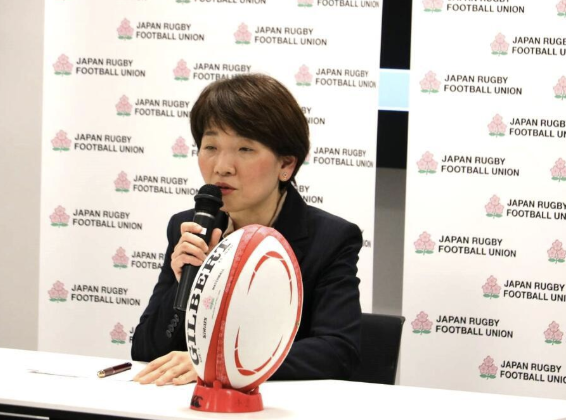
JAPAN: I believe that seeing women play rugby can inspire courage and hope
“I am learning the importance of respecting and caring for others.”
Keiko Asami

Akane Kagawa

Thanks to:
Keiko Asami
Vice President, Japan Rugby Football Union and Women’s HP Pathway
Akane Kagawa
Director of Women’s Rugby, Japan RFU
- The history of the women’s movement in Japan
- Testimonials
- Reading Time: 8 minutes
JAPAN - Find out more
HISTORY OF THE COUNTRY (Keiko Asami and Akane Kagawa)
1. When did the women’s rugby movement start in your country?
In the 1970s, women began playing rugby in different regions. However, it was only in 2002 (at the time of the 4th Women’s Rugby World Cup) that they became part of the current Japan Rugby Football Union, while in 1988 an organization called the “Women’s Rugby Federation” was founded by Noriko Kishida.
Keiko: We took part in the first, second, fourth, and from the eighth to the tenth Women’s Rugby World Cups (15s), and in rugby sevens from the Rio Olympics to those in Tokyo and Paris. Our women’s national team grew stronger quickly from 2010, when rugby sevens became an Olympic sport, alongside rugby fifteens. Both teams currently hold their best-ever world rankings. In our country, there is an annual series called the Taiyo Seimei Women’s Sevens Series, inspired by the SVNS circuit. This tournament has grown into a high-level competition, with some Japanese club teams fielding world-class athletes. Today, the head coaches of both the 15s and 7s women’s national teams are women. This is a source of pride. The number of female coaches in Japan is also increasing, albeit slowly. In refereeing, Ano Kuwai—who officiated at the Rio Olympics—also took part as a referee at the Paris Games last year. It was the first time this happened in rugby. (Very few unions worldwide have managed to achieve this across both men’s and women’s competitions). There are only about 5,000 registered female players in the federation. There are fewer than 10 adult club teams able to play fifteens independently. In sevens, however, there are 40 teams. The total number of registered teams is about 70, though they vary in level, frequency of activity, and age composition. Tag rugby has been introduced in some elementary schools. In elementary and junior high schools, most girls play rugby together with boys. Girls’ rugby in high schools is growing significantly, with some strong boys’ teams creating girls’ clubs as well. Universities and senior clubs compete in the same tournaments. Some senior club players can find employment through corporate sponsors, and at the national level, some can play in supportive environments. In Japan, women’s rugby is divided, to some extent, into two seasons: sevens is played in spring and summer, while fifteens is played in autumn and winter.
Akane: The history of women’s rugby in Japan concretely began in 1983. That year, women’s teams were founded almost simultaneously in Tokyo, Nagoya, and Matsusaka, officially starting the practice of women’s rugby in the country. In Tokyo, seven women took part in a “beginner rugby workshop” organized in the Setagaya district, which led to the creation of the Setagaya Ladies. The media covered this movement, helping the formation of teams in other regions as well. In 1984, the Setagaya Ladies played against the Nagoya Ladies (formerly Brother Industries Ladies) and the Matsusaka Ladies in the first official women’s rugby match. Later, in April 1988, the Japan Women’s Rugby Football Union was founded, and in November that year, the first Women’s Rugby Exchange Tournament was held at the Komazawa Stadium training ground in Tokyo. Internationally, the Japanese women’s team competed in the first Women’s Rugby World Cup in 1991, and achieved their first win in the second edition in 1994, defeating Sweden 10–5. In 2010, a Women’s Committee was set up within the Japan Rugby Football Union to improve the competitiveness and popularity of women’s rugby. Since then, structured development and promotional activities have been introduced, leading the Sakura Sevens (the national women’s sevens team) to compete for the first time at the Rio 2016 Olympics. Today there are around 70 women’s teams. Women’s rugby is overseen by the Japan Rugby Football Union (JRFU), a public interest incorporated foundation. Within the organization, a department dedicated to the development of women’s rugby was created to enhance competitiveness and promote the game. In April 2023, the “Medium- to Long-Term Strategic Plan for Women’s Rugby” was adopted, outlining a vision for development through 2050. This plan is based on the broader Japan Rugby 2050 strategy launched in 2021 and defines the direction and actions for the future of women’s rugby. 15s National Team: Sakura Fifteen / Domestic competitions: Women’s National Rugby Championship, etc. / International competitions: Women’s Rugby World Cup, test matches.
7s National Team: Sakura Sevens / Domestic competitions: Taiyo Life Women’s Sevens Series, etc. / International competitions: HSBC World Rugby Sevens Series, Olympic Games. To promote women’s rugby and raise its level, Japan has created a system of training and development programs, including: Women’s Sevens Youth Academy: an academy to nurture young players. Female Talent Identification and Development (TID) Program: aimed at spotting and developing junior and youth talent. Regional leagues and club teams: active women’s teams at the regional level, with grassroots promotional activities.
2. Do you think playing rugby has a social impact for a woman in your country?
Keiko: Yes. In our country, gender gap rankings and indices are quite low. Therefore, women’s success is rare and has an impact on society—but there are still too few of them.
Akane: I believe that seeing women play rugby can inspire courage and hope.
3. In your opinion, what can rugby give to women in your country?
Keiko: We believe rugby can offer many things: physical and mental health, and the confidence that comes with it. Moreover, Japan is facing demographic decline, and there has always been a tendency to focus on just one sport. Rugby combines many kinds of movements and connects with other sports. Many athletes—especially women—come to rugby as a challenge after practicing other sports. No other sport is played by such a wide range of people with so many different body types and personalities. I believe the appeal of rugby also lies in experiencing acceptance and understanding of others, which can enrich mental growth and self-awareness.
Akane: In Japan, I believe women’s rugby can convey a “pioneering spirit” to women. Our predecessors, who built the history of women’s rugby up to today, always faced challenges fearlessly. I think this spirit carries a powerful message for women in Japan, a country where it is often difficult to fully express oneself.
JOURNEYS THROUGH RUGBY (Keiko Asami)
1. When did you start playing rugby and how did you discover it?
I was 18 when I started university. There was a women’s rugby club at the university, and I joined it.
2. What has rugby taught you that has had an impact on your daily life? Can you give an example of when a rugby mindset was useful to you?
Being selected for the national team at the age of 19 gave me great confidence. It also broadened my perspective on the world, as I played abroad for the first time and studied rugby in New Zealand. I am learning the importance of respecting and caring for others, of being open-minded, responsible, and aware—even now, after holding various roles. I feel fortunate to have worked in rugby all my life, which has allowed me to apply these lessons in many contexts. I often work with younger generations, which gives me the chance to address these formative aspects at an impressionable stage.
3. Can you give me three words that connect rugby with freedom?
Open-mindedness, self-expression, and growth.
4. What does it mean to you to live in a land of freedom?
Expressing myself according to my abilities, relationships, and potential.
5. What is a quote that guides your life?
It’s not really a quote, but I am guided by sincerity. It is something I always try to practice with everyone.
